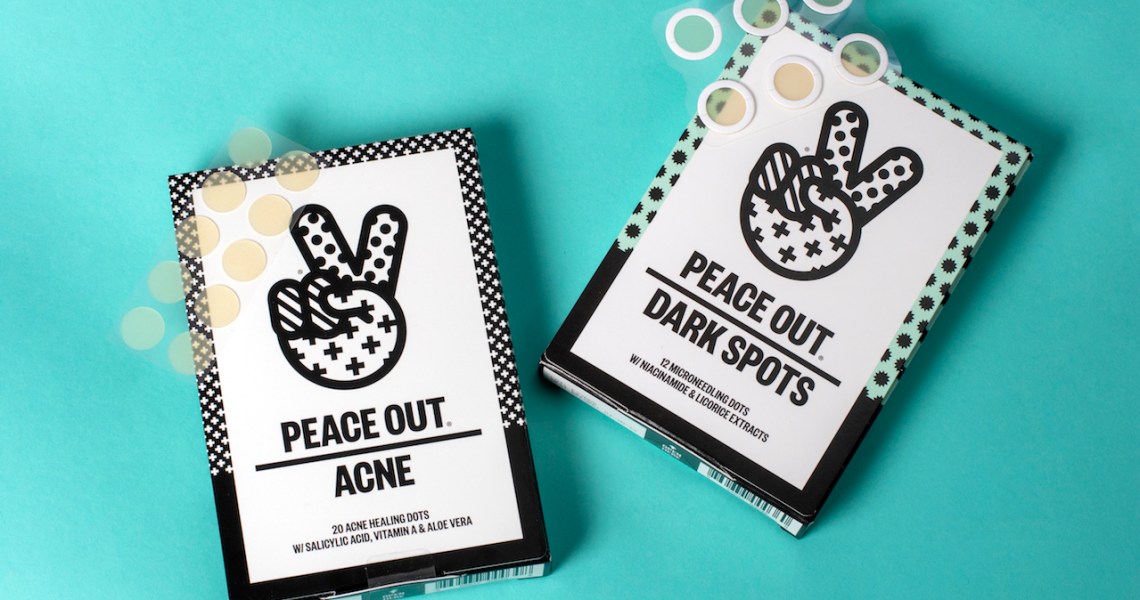Peace Out Skincare, an indie brand dedicated to acne and aging products, has thrown out its playbook of driving customers to Sephora’s stores and website, in favor of increasing its DTC sales.
Peace Out, which launched in July 2017 as a Sephora exclusive, previously established a growth strategy and content marketing plan that focused on growing its sales at Sephora. The brand is sold in 1,100 Sephora stores and shop-in-shops at J.C. Penney, as well as on Sephora.com, and launched e-commerce capabilities on its DTC website in August 2019. With Sephora stores closed, Peace Out is driving more people to its website, plus it’s updated its advertising strategy in step with its customers’ changing behavior: They’ve become more focused on tangible product benefits and are even stocking up on skin care. So far, the results are paying off: DTC customer purchases increased from one or two products to four or more over the last five weeks, and the brand experienced 400% year-over-year sales growth in March, making it the best sales month to date since it launched in 2017, said Enrico Frezza, Peace Out Skincare founder and CEO.
As of 2019, Peace Out Skincare’s DTC sales accounted for 10% of the business, and it’s expected to maintain its forecasted growth to 25% in 2020, according to Frezza and co-founder Junior Scott Pence. Peace Out Skincare experienced 300% sales growth and reached $12 million in total sales in 2019, and the company expects to reach $20 million in retail sales in 2020; this figure was re-forecasted in March from $24 million, said Frezza. He declined to specify what percentage of Sephora sales are e-commerce versus in-store, but he said the company will expand to Sephora Canada in May, and Sephora Australia and Sephora New Zealand in July — all via e-commerce — if stores remain closed.
“We are not changing our goal for e-commerce at this time,” said Frezza. “That said, we don’t know how the consumer is going to react once stores start to reopen. The economic return will vary across regions, so it’s difficult to predict.”
Prior to coronavirus, about 70% of Peace Out Skincare’s advertising, both online and offline, directed people to Sephora’s e-commerce site, but that percentage now changes every day, said Frezza. Peace Out Skincare advertises on Instagram, Google and Facebook ads, and works with programmatic ad firm Advertising Purple for ads on websites and other channels. Beginning March 9, the brand began seeing changes in customers’ reception to ad visuals and copy on its site. Typically, ads featured models and rhyming copy like “Stick it, Don’t Pick it,” and “Fine Lines Hit Rewind,” but ads showcasing product and more straightforward information started seeing a better engagement rate. It immediately updated ads to feature more result-oriented statements. Because of this, conversion via the brand’s website has jumped from 2% to 5.1% in March, above the industry average of 2.3%, said Frezza.
“During this health crisis we have noticed that people are more interested in informative, factual ads versus aspirational ones,” he said. “Advertisements featuring informative copy describing the efficacy of products are outperforming ads with models almost three-to-one for purchasing, and seven-to-one for click-through.”
In order to reach and speak to varying customers differently, Peace Out Skincare has a unique communications style for Instagram, Facebook, Pinterest and Twitter. Instagram is the largest driver of traffic to the brand’s website, followed by Google SEO and unpaid and affiliate press links. On its own website, Peace Out Skincare publishes about 10 blog posts over the course of a month. In total, the company publishes 40 to 60 pieces of content monthly across social media.
Despite the brand’s focus on its own channel, Sephora still accounts for a percentage of its sales, through Sephora.com. On April 1, Sephora.com launched its own campaign called “Skincare for Every Age” that featured Peace Out Skincare’s Acne/Dark Spots Combo in the teenager category with four other brands. Sephora also re-posted Peace Out Skincare’s Instagram posts on March 18 and April 19 to its 19.8 million followers, at the retailer’s discretion. To balance its own e-commerce with Sephora.com and ensure its exclusive partnership is successful, Peace Out Skincare traditionally launches a new product (most recently, its brightening wipes in February) exclusively at Sephora and Sephora.com before launching it on its own DTC website four weeks later. The next product launch is planned for the third quarter.
“What we’re finding is that there is no cannibalization of our Sephora business versus our e-commerce business, the latter of which is being driven by other forces,” said Junior Scott Pence, Peace Out Skincare CMO and creative director.




